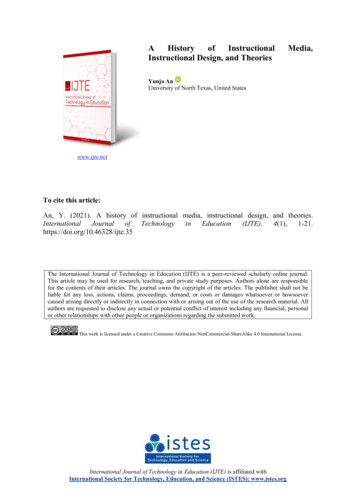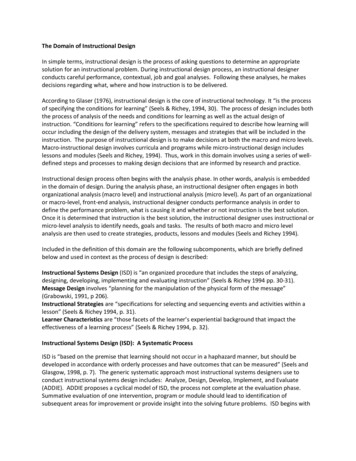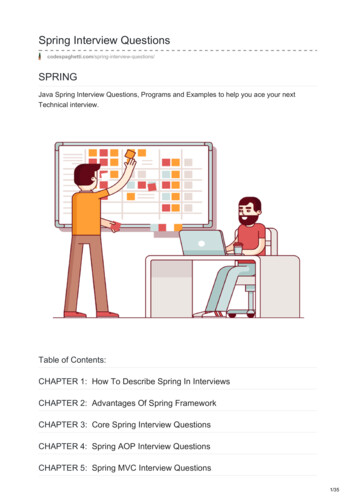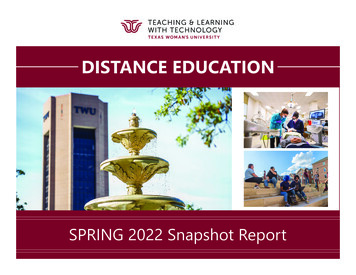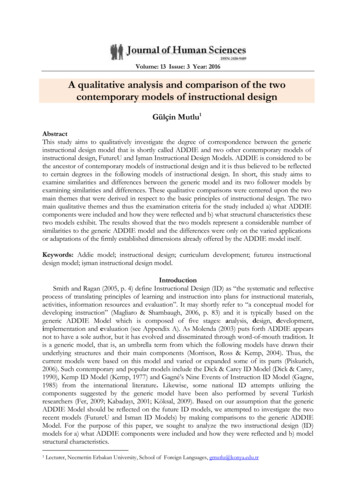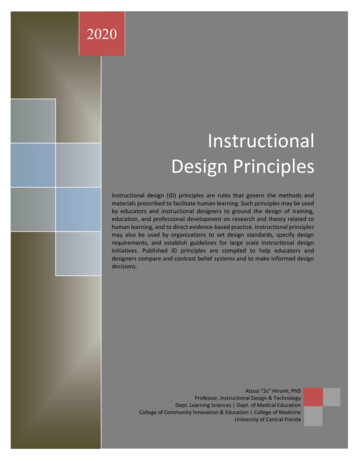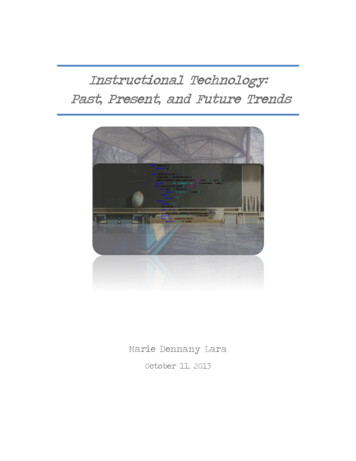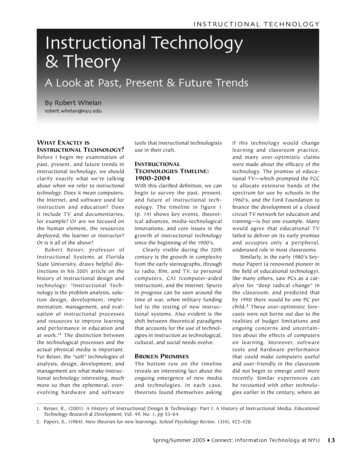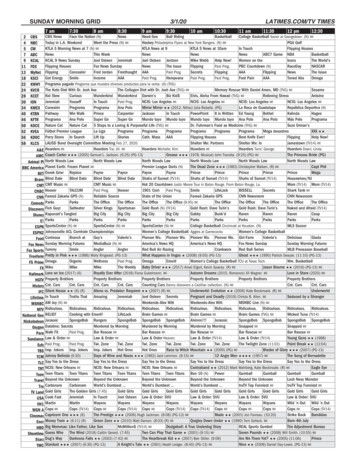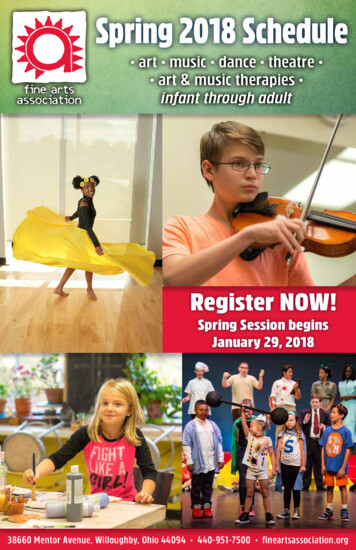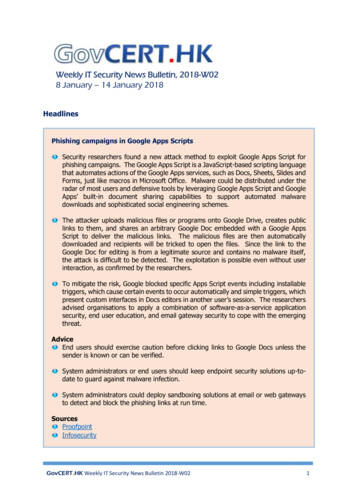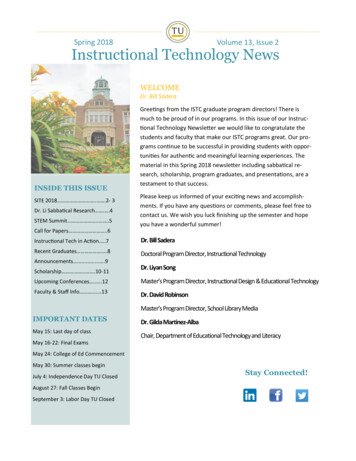
Transcription
Spring 2018Volume 13, Issue 2Instructional Technology NewsWELCOMEDr. Bill SaderaINSIDE THIS ISSUESITE 2018 . .2- 3Dr. Li Sabbatical Research . .4STEM Summit . .5Greetings from the ISTC graduate program directors! There ismuch to be proud of in our programs. In this issue of our Instructional Technology Newsletter we would like to congratulate thestudents and faculty that make our ISTC programs great. Our programs continue to be successful in providing students with opportunities for authentic and meaningful learning experiences. Thematerial in this Spring 2018 newsletter including sabbatical research, scholarship, program graduates, and presentations, are atestament to that success.Please keep us informed of your exciting news and accomplishments. If you have any questions or comments, please feel free tocontact us. We wish you luck finishing up the semester and hopeyou have a wonderful summer!Call for Papers .6Instructional Tech in Action .7Dr. Bill SaderaRecent Graduates . .8Doctoral Program Director, Instructional TechnologyAnnouncements .9Scholarship . . .10-11Dr. Liyan SongUpcoming Conferences .12Master’s Program Director, Instructional Design & Educational TechnologyFaculty & Staff Info .13Dr. David RobinsonMaster’s Program Director, School Library MediaIMPORTANT DATESMay 15: Last day of classDr. Gilda Martinez-AlbaChair, Department of Educational Technology and LiteracyMay 16-22: Final ExamsMay 24: College of Ed CommencementMay 30: Summer classes beginJuly 4: Independence Day TU ClosedAugust 27: Fall Classes BeginSeptember 3: Labor Day TU ClosedStay Connected!
STUDENT REFLECTIONJoe Runciman, Ed.D. StudentThis Spring, I was given the opportunity to design andlead a poster presentation at SITE2018 in connection withmy research assistantship with Dr. Lohnes Watulak andDr. McQuitty. This was my first year attending and presenting at an academic conference. I was thrilled to havethe opportunity to discuss our work on the design andimplementation of a writing-as-making MOOC. We hadjust completed a winter iteration of our MOOC, so I enjoyed getting to speak with scholars about what we observed in delivering online professionallearning that combines xMOOC and cMOOC characteristics to teach digital writing tools andtechniques.I was also able to attend several sessions that focused on professional development, gamebased learning, and learning with MOOCs. These presentations were a great chance to hearabout the latest research and ideas that connect with my research interests and academic work.The overall experience helped familiarize me with the workings of a conference, and if I canattend next year’s SITE, I will be all the more prepared to take advantage of what it has to offer!Towson University's College of Education co-hosted a receptionat this year's SITE Conference in DC with Iowa State Universityand Michigan State.54 scholars attended the reception.Attendees represented programsfrom across the country including:Arizona State, Drexel, NYIT, SonomaState University, University of IdahoUniversity of North Texas , and WakeForest.“It’s always great to gather withresearchers, colleagues, & students, tobuild relationships and talk aboutwork in the field in an informal settingsuch as this!” Dr. Bill SaderaPictured left to right: Dr. Denise Crawford, Iowa State; TeraLawson, Iowa State; Leigh Wolf, Michigan State; Junko Handa,Meiji University, Japan; Dr. Bill Sadera. And a few familiarfaces in the background!2
MARCH 26-30WASHGINTON D.C.The 29th Annual Society for Information Technology and Teacher Education conference took place outside ofWashington, D.C. in Alexandria, VA.Towson University was well represented at the conference with 13 presentations by 18 faculty, recent grads, andstudents.Amy McGinn & Liyan Song: Teacher experiences with professional development for technology integration at a k-12 independent school: a multi-case studyAndrea Parrish & Bill Sadera: A Delphi Study to Develop an Inventory of Competencies needed to facilitate instruction in student-centered, 1:1 learning environmentsBarbara Laster, Rhoades (VCU), Wilson, (Nebraska-Lincoln): Literacy Teachers Using iPads in clinicalsettingsChip Boling & Qing Li: Simulations in mathematics classrooms: A study of students' attitudesNatalie Shaheen (picture below) & Sarah Lohnes Watulak: Technology accessibility: a social justice concern for k-12 instructional technology and teacher educationLisa Twiss: How urban youth use digital tools at community technology centers(ctcs) to support the development of civic engagement pathwaysMarie Heath & Gleason, Iowa State (Pictured below): Exploring narrative throughsocial media: An approach to conceptualizing story, inquiry, and pedagogical approachesMarie Heath, Pamela Segal, & Rob Caples: But why do Ineed to teach technology in my content methods class?: A model for side coaching and technology integration for teacher educatorsMing Tomayko: Pre-Service Teachers Self- Assessing TPACK Using a Visual quantitative modelSarah Lohnes Watulak, Vicki McQuitty, & Joseph Runciman: Voice and choice inteacher professional learning: designing the writing-as-making MOOC3Qing Li, Laila Richman, & Scot McNary: Computational Thinking and teacher thinking: An examination ofa PD modelLaila J. Richman W/ researchers from Alabama, Saint Leo, Brigham Young & Park University: Preparingteacher candidates for transformative digital teaching and learning experiences: Case studies from teacher
SABBATICAL RESEARCHREFLECTIONBy Dr. Qing LiDuring my sabbatical leave in Fall 2017, I was ableto work on several projects. The first project,Computational Thinking (CT) and Teacher Education, aimed to study how CT can be organicallyintegrated into k-12 schools, and in particular howwe can best prepare our preservice and in-serviceteachers to teach this new content.This project contains two parts. The first partadopted the experts’ interview approach becausethis is a relatively new field of study. After reviewing the existing literature, I derived the semistructured interview questions and contacted afew experts in the field. Upon receiving the approval from the IRB committee, I started my interviews. Through snowball sampling, I was able toidentify and interview 6 experts in the field acrossthe nation. They are pioneers with extensive experience and have published well-recognizedwork in this field. Amongst them, 4 are professorsat R1 universities and 2 experts work as programdirectors in large companies. For example, oneexpert I interviewed is Hong Hai, a program manager at Google. He leads Google’s US outreachand partnership efforts for Google Computer Science Education Team.The second part of this project involved identifying and visiting an exemplary site. I visited MITand had extensive conversations with facultymembers, researchers, and students there. Theinterviews, notes I took, and my reflective journals became part of the data set that are used forthe analysis. To date, I have openly coded the data and am working on thesecond round of dataanalysis.Another project I have been working is titled: “CTfor all: Empowering teachers to effectively integrate computer science into the elementary, middle, and high school STEM curriculum”, which wasfunded 149,993 by MHEC for 2017-2018. This is apartnership between TU’s Fisher College of Science & Mathematics, College of Education, andBCPS. As the Principal Investigator, I have beenworking with colleagues, including Dr. Laila Richman (Co-PI), Dr. Scot McNary and other peopleinside and outside of Towson University. We havedeveloped a professional development (PD) model, created CT infused curriculum for teachers, andfacilitated various sessions to help BCPS teachersdevelop both content and pedagogical knowledgein order to organically integrate CT into theirteaching practices. Our continued assessment ofthe project shows that teachers not only enjoythis professional development opportunities, butalso have been impacted by this project indifferent ways.An opportunity that Ienjoyed over the sabbatical was the time toestablish collaborativerelationships. I spent time to talk with colleaguesin and out of TU and have worked on severalwriting projects, one of which was the submissionof a large grant application. I also enjoyed thetime for me to write. The writing outcomes included, but not limited to, 3 conference paperspresented in Spring 2018, as well as two journalpapers (one paper was already accepted by Educational Technology Research and Development(ETRD)).In summary, during my sabbatical I was able tostrengthen and expand my research program focusing on educational technology and teacher education. I am deeply grateful to COE and EDTL forgranting me this privilege which allows me tohave accomplish so much using this dedicated research time.4
STEM SUMMIT 2018Sarah Mott: James Collins, Jr. (picturedbelow on left) of Fable Vision Studiosstressed the importance of gaming andlearning. Specifically, narrative gaming,where children are learning morals andnew ideas from participating in gameOn March 12th, 4 faculty and 6 of our masters andbased learning. Collins discussed narradoctoral graduate students attended the Northeasttive gaming as incorporating aspects ofern Maryland Technology Council (NMTC) hostedSTEM Summit. Here is what two Masters studentsfiction and story-telling into game-basedthat attended the event had to say!learningopportunities. There is a lot debate within narrative gaming, yet Collins argues there are a lot of morals and information to be consumedin narrative gaming applications. Gamification in the educationaltechnology world is an approach to motivate students to learn by using video game elements in learning environments. Jason MichaelPerry (picture right) of Mind Grub discussed the benefits of virtualreality and how 3D printing could lead to better schools and educational opportunities. Don Lail, Jr., a game development engineer atExcet, Inc. who creates educationaltechnology opportunities for the US Army, defined and discusseddifferent types of reality and how these learning tools help to prepare US soldiers in training. At the seminar, three types of realitieswere discussed. Virtual reality is the ability to learn from a completely replaced environment. Augmented reality includes the ability for digital content to be displayed, on top of a physical environment. Finally, in mixed reality virtual objects are combined and responsive to a physical environment. John Fritz of UMBC gave an analytics presentation on college predictors for freshman and failingstudents and discussed interventions that the university was using in order to reach those students. Finally, Douglas A. Levin of Edtech Strategies discussedterms of services, policies, and security in education technology.NMTC hosts several simShawna Maxey: The STEM Summit was very informative andilar events throughoutgave a lot of information about where we are headed in the areathe year. Check themof technology in the classroom and in education. I enjoyed learnout here.ing about gamification in learning and how students can learnthrough games. Also, I learned about virtual reality and how itcan be helpful in creating a deeper understanding and experience when used. I think it is important5for educators to continue to learn how to incorporate technology into the classroom as it is continually growing and changing.Disrupting the Classroom: HowTechnology is Changing theWay We Learn
CALL FOR PAPERS!Although much has been made of the potential fordigital technologies to support more equitable andThe International Journal of Informationand Learning Technology invites submissions for a special issue focusing on theoryand research that explores issues aroundequity and digital technologies.democratic teaching and learning (e.g., Ito et al.,2013; Gee, 2007), Hall (2011) suggests a need forscholarship in instructional technology and digitaleducation to "analyze learning technology as historically situated, and thereby. use critique to revealand produce practical alternatives to sociocultural problems" (p.273). Such critical scholarship push-es back on platitudes and widely-accepted myths about educational technology to address thecomplexities of reducing educational inequities (Buckingham, 2007; Reich & Ito, 2017; Selwyn,2016). Recent work -- including critical examinations of technologically-rich makerspaces (CalabreseBarton, Tan & Greenberg, 2017; Vossoughi, Hooper, & Escude, 2016; Buechley, 2013), conversations around who benefits from educational technology (Watters, 2017), articulations of critical digital pedagogy (Stommel, 2014), and accounts of gender and race disparities in the field of instructional technology (Davis, 2015)-- attempts to explore, better account for, and counter inequities indigital teaching and learning.In this special issue, we are interested in exploring how equity is taken up in discourse and practiceacross K-16 and informal learning settings featuring digital technologies and pedagogies. This mightinclude empirical research related to learning processes, contexts, and outcomes; frameworks forunderstanding ways of creating more equitable instructional design with digital technologies; pedagogical approaches for using new media assites of learning. We encourage the submission of manuscript types including litera-Deadline for Full Manuscripts: June 1, 2018For more info: http://bit.ly/2puzGRdture reviews; reports of original research(quantitative, qualitative, mixed methods);and theoretical perspectives.ATTENTION DOCTORALSTUDENTSNEW DOCTORAL RESEARCH COURSE SEQUENCEBEGINNING FALL 2018The new sequence will include 3 courses: EDUC789: Introduction to Research Methods, EDUC790: Qualitative Methods, and EDUC791: Statistics. The research sequence is completed for 3 consecutive semesters. EDUC 789, is being offered this Fall 2018as the start of the new sequence. The next sequence will start in approximately Spring 2020.Contact Dr. Sadera if you have questions or want to be in the cohort and have not already heardfrom him.6
INSTRUCTIONAL TECH IN ACTIONBreakout EDU Escape rooms have become incredibly popular overthe past several years. As the title suggests, teams find clues and solve puzzlesto escape a room, before time runs out. Thanks to Breakout EDU, the trend isnow spreading into the classroom! Breakout EDU is an educational technologybased on “the 4 Cs:” critical thinking, collaboration, creativity & communication, which has harnessed the power of escape rooms. Kitsinclude a series of locks, boxes, and tools to send students on an immersive & educational voyage. Students of all ages can take part in Breakout EDU gamesOur department recently invested in a Breakout EDU kit for use by our facultyand students. We have already had a lot of fun with kit! It has been used with 2ndgraders (picture below on left), department faculty (below on right), a girl scouttroop, and Lisa Twiss has used it with her undergrad students. For more examplesfollow @breakoutEDU on Twitter.7
RECENT GRADUATESCongratulations to Drs. Burton, McGinn, McFadden, and Parrish forsuccessful dissertation defensed and graduation! Dissertation abstracts are linked below.Burton, T. (2017). The impact of learning environment on knowledge outcomes and student satisfaction in sleep medicine education. (Doctoral Dissertation, Towson University).Greenwood, A. (2017). Patterns of educator learning management systems use in a secondary school:A description of use and comparison between educator subgroups. (Doctoral Dissertation, TowsonUniversity, 2017).McFadden, C. (2017). Motivational readiness to change exercise behaviors:An analysis of the differences among exercise, wearable exercise trackingtechnology, FIT values and BMI scores. (Doctoral Dissertation, Towson University).McGinn, A. (2017). Teacher experiences with professional development fortechnology integration at an independent k-12 school: a multi-case study.(Doctoral Dissertation, Towson University).Parrish, A. (2017). A Delphi study to develop an inventory of competencies needed to facilitate instruction in student-centered, one-to-one learning environments. (Doctoral Dissertation, Towson University).Congratulations to the following spring & fall 2017 Master’s programgraduates!Instruction Design & DevelopmentMelissa ChenowethTanisha PeterkinAdi AdiEducational TechnologyChristopher FishpawSamantha VindigniPeter deBorjaCarolyn SutherlandLaura AbrahamInstructional Technology Community on BlackboardPlease make sure to visit the ISTC Community on Blackboard forup-to-date news about Instructional Technology, employment opportunities, important events scholarshipopportunities, conferences, and electronic copies of program forms.8
ANNOUNCEMENTSNichole Batluck, a Master’s student has accepted a permanent position as a Special Education Para-educator inWe’re proud of all faculty, students, and forMontgomery County Public School System. She will bemer students for the work they do everyday.working at a regional school, RICA, for students with emoThis section is to congratulate those honoredfor their hard work and working in their fields tional disabilities, other health impairment and Autism.Way to go Nichole!in new and exciting ways.Magdalena Fitzsimmons, first year Doctoral student willteach a two-day session on June 25-26 as part of this year’s Summer Institute for Gifted Education, locatedat the Center for Gifted Education, College of William and Mary in Williamsburg, Virginia. The session, titled Beyond the Main Idea: Using Constructivist Approaches to Engage Gifted Students with ChallengingTexts, explores constructivist approaches to instruction that engage gifted students with text, encouragingthem to develop an understanding of challenging content through rigorous learning tasks.Kim Miller , doctoral student, was recently awarded permanent status in her roleas Learning Technologies Librarian at Towson University. Kim and her husband alsorecently welcomed their daughter Maggie, born 1/15/18.Shannon Tucker, doctoral student has been involved in several research efforts. Sheserved on the programming committee for the Quality Matters Regional East Conference March 22-23, 2018; Shannon was a Poster Reviewer for the 2018 American Association of Colleges of Pharmacy Annual Meeting; Proposal Reviewer, 2018 EDUCAUSEConference, 2018 EDUCAUSE Learning Initiative (ELI) Annual Meeting Poster Presentation. Shannon willalso be a member on a panel of researchers at the 2018 WLU Literacies for All Summer Institute: Panelpresentation: Challenging Common Notions of Reading with Eye Movement and Miscue Analysis (EMMA)Saturday 7/14, 2018.Marie Heath, doctoral program alumna and TU Secondary and Middle School Education faculty memberwill be joining the faculty at Loyola University of Maryland as an Assistant Professor in Educational Technology as of the Fall 2018 school year.School Library Media Spring 2018 Practicum PlacementsInternPlacement 1MentorPlacement 2MentorMeghan Bennett-Marx North Harford Middle School (HCPS)Brianna FigueirasTracy’s Elementary(AACPS)David McComasBel Air ElementarySchool (HCPS)Southern HighSchool (AACPS)Stephanie PlattKate HartigJennifer SheggrudHereford HighSchoolSuhaila TenlyPadonia Elementary(BCPS)Carol ThortonElizabethStarnes
RECENTSCHOLARSHIPBoling, C., Li, Q. (2018, March). Simulations in mathematics classrooms: A study ofstudents' attitudes. Paper presented at the annual meeting of the Society for Instructional Technology in Teacher Education, Washington, D.C.Heath, M., Segal, P., Caples, R. (2018, March). But why do I need to teach technologyin my content methods class?: A model for side coaching and technology integration for teacher educators. Paper t the annual meeting of the Society for Instructional Technology in Teacher Education, Washington, D.C.Heath, M.,& Gleason. (2018, March). Exploring narrative through social media: An approach to conceptualizing story, inquiry, and pedagogical approaches. Paper resented at the annual meeting of the Society for Instructional Technology inTeacher Education, Washington, D.C.Leigh, A.O., Stansbury, J.A., Munro, G.D., & McGinley, J.J. (2018). To push or not to push? Responses in moral dilemmas reveal aversion to harmful actions rather than moral preferences. Oral Presentation delivered at Society of Personality andSocial Psychology National Conference, Atlanta, GA.Li, Q., Pustaka, A. (2017). When cyberbullies meet gamers: what do young adults think?, Educational Research, 59:4, 426443.Li, Q. (May, 2018). Teacher game building: A focus on computational thinking and pedagogy. Paper to be presented at the20th Annual International Conference on Education. Athens, GA.Li, Q., Richman, L., McNary, S. (2018, March). Computational thinking and teacher thinking: An examination of a PD model.Paper presented at the annual meeting of the Society for Instructional Technology in Teacher Education, Washington, D.C.Lohnes Watulak, S., Woodard, R., Smith, A., Johnson, L., & Phillips, N. (in press). Connected teaching and learning in K-16 contexts: An annotated bibliography. CITE English.Lohnes Watulak, S. (2018, April). Instructors as brokers of digital learning opportunity: Exploring brokering practices in connected teacher education classrooms. Poster presented at the annual meeting of the American Educational Research Association, NY, NY.Lohnes Watulak, S., McQuitty, V., & Runciman, J. (2018, March). Voice and choice in teacher professional learning: Designingthe writing-as-making MOOC. Poster presented at the annual meeting of the Society for Instructional Technology in TeacherEducation, Washington, D.C.Lohnes Watulak, S., McQuitty, V., & Runciman, J. (2018, March). Examining teacher learning in a writing-as-making MOOC.Symposium presented at the annual meeting of the National Council of Teachers of English Assembly for Research, Towson,MD.Long, M. & Martin, A.C. (2018) Cookie Rubrics at the County Fair. Presentation for AFACCT Conference, January 11, 2018,Arnold, MDMartin, A.C. & Galloway, J.C. (2018) Escape This Workshop! Using Escape Rooms in Instruction and Professional Development Presentation for AFACCT Conference, January 11, 2018, Arnold, MDMills, K., Seligman E., & Ketelhut, D.J. (2017). Idea bank: Using apps that support scientific practices. National Science Teachers Association. The Science Teacher. 18 (9).
RECENTSCHOLARSHIPMcGinn, A., Song, L. (2018, March). Teacher experiences with professional development for technology integration at a k-12 independent school: a multi-case study. Paper presented at the annual meeting of the Society for Instructional Technology inTeacher Education, Washington, D.C.Parrish, A., Sadera, W. (2018, March). A Delphi Study to Develop an Inventory of Competencies needed to facilitate instruction in student-centered, 1:1 learning environments. Paper presented at the annual meeting of the Society for Instructional Technology in Teacher Education, Washington, D.C.Parrish, A., Sadera, W. (2018, April). A Delphi Study to Develop an Inventory of Competencies needed to facilitate instruction in student-centered, One-to– One learning environments. Poster presented at the annual meeting of the AmericanEducational Research Association, NY, NY.Pautz, S. and Schiner, N. (2018, March). Redefining learning spaces: The BCPS Mobile Innovation Lab. Poster presentationat ASCD Empower18, Boston, MA.Pautz, S. and McNulty, T. (2018, Feb). Interdependence in a digital ecosystem: Academics, instruction, and innovation.Workshop presented at the National Conference on Digital Convergence, Jacksonville, FL.Pautz, S. and Sadera, W. (2018, June). A first-year principal's experience leading a one-to-one computing initiative. Upcoming research round table at Society for Information Technology & Teacher Education International Conference 2018,Chicago, IL.Schmier, S., Johnson, E., & Lohnes Watulak, S. (2018). Going public: Exploring the possibilities for publishing student interest-driven writing beyond the classroom. Australian Journal of Language and Literacy, 41(1), 57-66.Shaheen, N., Lohnes Watulak, S. (2018, March). Technology accessibility: a social justice concern for k-12 instructionaltechnology and teacher education. Poster presented at the annual meeting of the Society for Instructional Technology inTeacher Education, Washington, D.C.Song, L. (2018, March). Improving preservice teachers’ self-efficacy on technology integration through service learning.Paper presented at the annual meeting of the Society for Instructional Technology in Teacher Education, Washington,D.C.Stansbury, J. A (2018, March). Play on: Using games to enhance learning in the classroom. Invited teaching talk for Towson University’s Smarter Not Harder Series, College of Health Professions. Towson, MD.Stansbury, J. A., & Earnest, D. R. (2018, March). Gamification and the publication game. Invited teaching talk for TowsonUniversity’s Office of Academic Innovation. Towson, MD.Tucker, S., Summers, K., McGowan, T., & Klimas, C. (2018). Evaluating the Benefit of Accordion Web Elements for LowLiteracy Populations, Human Computer Interaction International 2018, Las Vegas, NV. July 15-20 2018.Tucker, S., Lin, N., Hinegartner, P., & Ceraul, R. (2017, July). Building a Legacy for Tomorrow: A Collaboration Model toSupport Robust Digital Archives. Poster Session presented at the American Association Colleges of Pharmacy AnnualMeeting. Nashville, TN.Tucker, S., Polli, J., Coop, A., Bondy, M.J., Rietschel, M. (2017, July). Ensuring Quality in Online Graduate Education Usingthe Quality Matters Rubric. Poster Session presented at the American Association Colleges of Pharmacy Annual Meeting.Nashville, TN.Twiss, L. (2018, April). How urban youth use digital tools at community technology centers (ctcs) to support the development of civic engagement pathways. presented at the annual meeting of the Society for Instructional Technology inTeacher Education, Washington, D.C.
2018-2019 INSTRUCTIONAL TECHNOLOGY CONFERENCESBelow is a list of the upcoming conferences of which we are aware. We apologize if a conference that you are looking for is not listed. If youknow of other conferences that are not included, please feel free to post them on Blackboard.American Educational Research AssociationInternational Educational Technology(AERA) Annual MeetingConferenceApril 13– April 17, 2018August 8-10, 2018New York City, NYIndiana University, Bloomington, INMaryland Society for Educational TechnologyProposal deadline: August 3, 2018(MSET) ConferenceE-Learn ConferenceMay 3—4, 2018October 15-18, 2018Ocean City, MDLas Vegas, NVInternational Association of School Librarianship Proposals Due: June 1, 2018(IASL) ConferenceAssociation for Education Communications &May 6– 11, 2018Technology International Convention (AECT)Istanbul, TurkeyOctober 23– 27, 2018Proposal Deadline: April 23, 2018Kansas City, MOInternational Society for Technology in Education (ISTE) ConferenceProposal Deadline: TBAChicago, ILEastern Educational Research Association(EERA) Annual ConferenceProposal Deadline: April 27, 2018February 20-24, 2019June 24– 27, 2018World Conference on Educational Media, Hyper- Myrtle Beach, SCmedia, & Telecommunications (ED-MEDIA) Con- Proposal deadline: TBAferenceSociety for Information Technology & TeachingJune 25– 29, 2018Education (SITE) ConferenceAmsterdamProposal Deadline: December 18, 2017March 18– 22, 2019Las Vegas, NVProposal deadline: Fall 2018Opportunity to Present If you are interested in presenting at a conference, the Graduate Student Association (GSA) allots a portion of the GSA budget to be used specifically for funding student research and professional development. This includes but is not limited to presentations of a paper or project, research and originalwork, and attendance at a conference. The grant award for presenting is often in the amount of 500, and smaller amounts may be awarded for attending a conference, research, and original work. The ISTC department mayalso have resources available to support your work. Please contact your program director for more information.If you are interested in taking advantage of the GSA opportunity or for more information about the GSA Awardand application process, please visit http://grad.towson.edu/gsc/gsa/awards.asp.
INSTRUCTIONAL TECHNOLOGY GRADUATEFACULTY & STAFF INFORMATIONMAIN OFFICE—FAX410-704-4227 HH216DR. GILDA MARTINEZ-ALBA, Chairpersonx 4-4018HH216AMRS. RUTH HIPKINS, Administrative Assistantx 4-2576HH216DR. GAIL BAILEY, Clinical Assistant Professorx 4-2135HH107PMS. BONNIE MARAS BROWN, Lecturerx 4-3293HH102GDr. ROBERT CAPLES, Visiting Assistant Professorx 4-2579HH107PMS. DEBORAH FULLER, Director, Education Technology Centerx 4-2542HH210DDR. JEFF KENTON, Associate Professorx 4-4226HH102EDR. QING LI, Professorx 4-4631HH404CDR. SARAH LOHNES WATULAK, Associate Professorx 4-2545HH221DR. FRAN LUTHER, Assistant Professorx 4-4537HH315DR. SCOT MCNARY, Associate Professorx 4-4835HH102FMRS. SUZANNE OBENSHAIN, Lecturerx 4-3144HH211DR. DAVID ROBINSON, Asst. Professor School Library Media Program Director x 4-6301HH204ADR. WILLIAM SADERA, Professor, Doctoral Program Directorx 4-2731HH222DR. REBECCA SHARGEL, Associate Professorx 4-2617HH413FMR. DUANE SMITH, IT Managerx 4-2575HH210ADR. LIYAN SONG, Professor, Master’s Program Directorx 4-5751HH102DDR. LISA TWISS, Lecturerx 4-3473HH203DR. DAVID WIZER, Professorx 4-6268PSY200MS. CHERYL WOOD, Lecturerx 4-2687HH211Graduate AssistantsClare Bailey, Doctoral ProgramHH 222cbaile16@students.towson.eduAshley Pinter, Master’s ProgramHH 211apinte1@students.towson.edu
grate computer science into the elementary, mid-dle, and high school STEM curriculum", which was funded 149,993 by MHE for 2017-2018. This is a partnership between TU's Fisher ollege of Sci-ence & Mathematics, ollege of Education, and PS. As the Principal Investigator, I have been working with colleagues, including Dr. Laila Rich-
